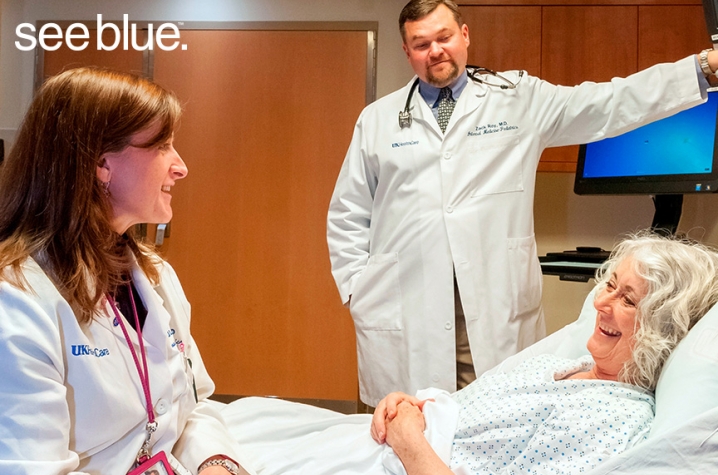UK Hospitalists Help Enhance Quality of Care for Patients

LEXINGTON, Ky. (June 7, 2016) – Managing and providing a continuum of care for patients with complex health care needs at a large academic medical center like UK HealthCare can be very complex when providers from multiple specialties and subspecialties are needed for tests, treatment and patient education.
UK HealthCare is at the forefront of a growing trend among U.S. hospitals to employ hospitalists, with more than 50,000 hospitalists now working in the U.S. Hospital medicine is the fastest growing specialty in the history of American medicine. At UK, hospitalists ensure coordination of quality care for acutely ill patients at the highest level from time of admission through discharge.
'Hospitalist' refers to an in-patient physician who dedicates his or her practice exclusively to the care of hospitalized patients. The hospitalist works with the patient's primary care outpatient physician and specialists to coordinate and manage round-the-clock care, like what Dr. Paula Bailey does at UK Chandler Hospital and the Kentucky Children's Hospital.
Bailey said hospital medicine appealed to her because she enjoys seeing acutely ill patients all the way through their hospital stay until they are well enough to go home. She also enjoys the variety of patients and problems she encounters on a day-to-day basis, and interacting with all the subspecialists who keep her current on the huge amount of new medical information that is continually evolving.
"We are the quarterbacks of the care team and we make sure we all work together to provide the most effective and efficient care," Bailey said. "Hospitalists must be current on the treatment of acute illness of all the systems of the body. We are experts in quality improvement and patient safety in the hospital. We are constantly looking to improve the complex systems in which we work."
Hospitalists typically spend their entire work day in the hospital and can be more readily available to a patient than a doctor who spends much of the day in an office or other outpatient clinical setting. Because the hospitalist is based at the hospital, they can gain a great deal of experience in the unique aspects of a patient's needs during the hospital stay.
Dr. Charles (Randy) Jones, associate chief for clinical services in the Division of Hospital Medicine at UK HealthCare's Good Samaritan Hospital, and director of the Hospitalist Advanced Practice Providers (APP) program, left private practice in rural Kentucky to become a hospitalist because he felt he would have the greatest impact on the most vulnerable of patients in need of hospitalization. He knew he would have the opportunity at UK to care for the most medically complex patients from all over Kentucky that would push him to be the best physician he can be. He would also be able to do more teaching and mentoring of medical residents interested in hospital medicine.
"We must be advocates for our patients in the milieu of insurance regulations, varying degrees of access to care, and the inherent challenges that come with taking care of patients with complex illnesses," Jones said. "Hospitalists must be adept at processing a large amount of information accurately and in a timely fashion in order to provide excellent delivery of care."
Dr. Mark V. Williams, chief in the Division of Hospital Medicine at UK, established the first hospitalist program for a public hospital in 1998, and built two of the largest academic hospitalist programs in the U.S. at Emory University (1998-2007) and Northwestern University (2007-2013). Williams is a past president of the Society of Hospital Medicine, one of the first 10 Masters in Hospital Medicine and the Founding Editor of the Journal of Hospital Medicine and continues to actively promote the role of hospitalists as leaders in delivery of health care to hospitalized patients.
On his arrival at UK in January 2014, the Department of Internal Medicine established a new Division of Hospital Medicine which rapidly grew from 24 hospitalists and two advanced practice providers (APP) to 60 clinicians now caring for more than 200 patients per day, seven days per week, 24 hours per day.
UK's Bailey and Jones are a good representation of the hospitalists dedicated exclusively to improving the overall hospital experience and quality of care for patients and their families.
"The thing I like most about my job is the sense that I am making a difference in the lives of my patients. Seeing patients flown in to the University of Kentucky and then be able to walk out under their own power is a reward in itself," Jones said. "Of course, the story does not always end that way. Another rewarding aspect of my job is the opportunity to care for patients who have chronic life threatening illnesses.
"I am honored to be involved in end-of-life care for patients who have no further treatment options for their disease. I strive to be a source of comfort to these patients and families both by means of my medical treatment and the relationships that are formed between provider and patient. Ultimately, medicine is still all about the patient-physician relationship and the patient's trust and physician's compassion that is at the heart of it."
Media Contact: Ann Blackford at 859-323-6442 or ann.blackford@uky.edu
###
UK is the University for Kentucky. At UK, we are educating more students, treating more patients with complex illnesses and conducting more research and service than at any time in our 150-year history. To read more about the UK story and how you can support continued investment in your university and the Commonwealth, visit uky.edu/uk4ky. #uky4ky #seeblue




